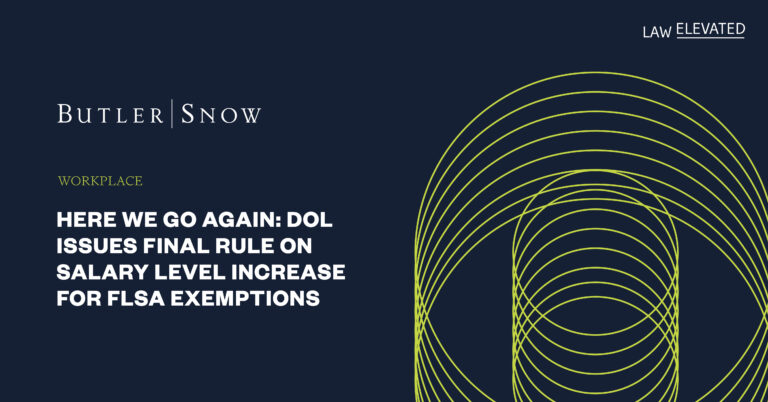On April 23, 2024, the United States Department of Labor (“DOL”) announced a final rule which will raise the salary threshold required to classify employees as exempt from overtime pay requirements under federal law. Effective July 1, 2024, the salary threshold will increase from the current level of $684 per week ($35,568 annualized) to $844 per week ($43,888 annualized). Then, on January 1, 2025, the salary threshold will increase to $1,128 per week ($58,656 annualized). These changes will result in a 65% overall increase in the FLSA salary threshold for overtime exemptions.
Background
The federal Fair Labor Standards Act (“FLSA”) requires covered employers to keep accurate records of employee work time, pay employees at least minimum wage at the current rate of $7.25 per hour, and pay overtime pay of at least 1.5 times the employee’s regular hourly rate if the employee works more than 40 hours in a 7-day workweek. However, there are exceptions to these requirements, called “exemptions.” For instance, under Section 13(a)(1) of the FLSA, “any employee employed in a bona fide executive, administrative, or professional capacity” is exempted from the timekeeping, minimum wage and overtime pay requirements of the statute. To qualify for one of these so-called “white collar” exemptions, employees must meet two requirements: (1) they must have job duties meeting the requirements of the exemption being relied on; and (2) they must be paid on a “salaried” or fee basis. Being paid on a “salaried” basis means being paid a guaranteed weekly amount which does not fluctuate based on the quality or quantity of work. In addition, federal rules set a minimum salary threshold to qualify for exempt status. The DOL’s “Final Rule” is all about that last part.
In addition to raising the minimum salary threshold for the white-collar exemptions, the Final Rule increases the annualized salary threshold for “highly compensated employees” to $151,164, up from $107,432. (The “highly compensated employee” or “HCE” exemption allows for less stringent duties requirements for high-earning employees). The Final Rule also provides that these minimum thresholds will update every three years based on the current wage data. The Final Rule only addresses salary level and does not impact the duties requirements for these exemptions.
According to DOL estimates, the rule is expected to result in an income transfer of about $1.5 billion from employers to workers in the first year, mainly from additional overtime pay or from pay raises to maintain the exempt status employees.
Next steps for employers
It is possible the final rule may never go into effect. When the DOL enacted a similarly large salary threshold increase in 2016, business groups and 21 states sued, and a federal judge in Texas issued an injunction preventing the rule from going into effect. However, a more recent salary threshold increase by the DOL, in 2019, was not challenged in the courts, and went into effect as scheduled.
Given the impending July 1, 2024, deadline for enforcement, employers should go ahead and make plans to comply with the new rule. As a first step, employers should identify current exempt salaried employees who earn less than $844 per week (while employers can use the $43,888 annualized amount as a point of reference, they should keep in mind that the threshold amount is a weekly requirement). Then, start thinking about the organizational impact, including both morale and budgetary considerations, of enacting salary increases to meet the new threshold versus reclassification to non-exempt status for those individuals. An important aspect of this will be considering the amount of weekly overtime actually worked by these employees.
Employers should also seize the moment and review their overall FLSA compliance. Although the impact of the Final Rule is limited to salary levels, any change by the DOL presents a window of opportunity for employers to conduct a full self-audit to make sure that all of their wage and hour practices are sound, and to correct any errors while coming into compliance with changes in the law. Remember also that any employees classified as exempt must qualify for exempt status based on their job duties as well as their pay, so employers may want to conduct a duties classification analysis as part of their review. Employers should also check to be sure exempt employees pay is not being subjected to improper deductions, which could destroy the “salaried basis” of payment and result in loss of exempt status.
Finally, employers need to decide how they are going to notify and train impacted workers. Any employees reclassified as non-exempt should be trained on timekeeping procedures, to avoid “off the clock” FLSA violations.
The DOL has activated a website with further information about the final rule. https://www.dol.gov/agencies/whd/overtime/rulemaking. And, as always, if in doubt, consider seeking the advice of an experienced employment attorney.
